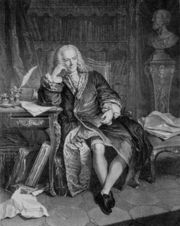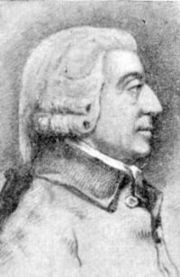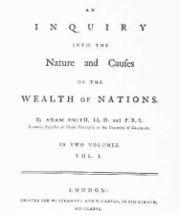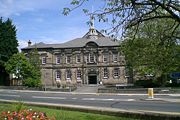Adam Smith
2008/9 Schools Wikipedia Selection. Related subjects: Economics; Historical figures
| Western Economists Classical economics (Modern economics) |
|
|---|---|
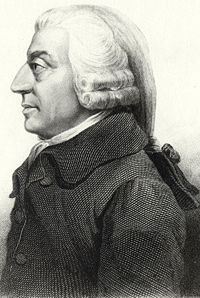 |
|
| Name |
Adam Smith
|
| Birth | June 16, 1723 (baptism) [ OS: June 5, 1723] Kirkcaldy, Scotland |
| Death | July 17, 1790 (aged 67) Edinburgh, Scotland |
| School/tradition | Classical economics |
| Main interests | Political philosophy, ethics, economics |
| Notable ideas | Classical economics, modern free market, division of labour, the " invisible hand" |
| Influenced by | Aristotle, Hobbes, Butler, Locke, Mandeville, Hutcheson, Hume, Quesnay |
| Influenced | Chomsky, Comte, Hayek, Engels, Friedman, Malthus, Marx, Mill, Keynes, Montesquieu, Ricardo, US Founding Fathers |
Adam Smith ( baptised June 16, 1723 – July 17, 1790 [ OS: June 5, 1723 – July 17, 1790]) was a Scottish moral philosopher and a pioneering political economist. One of the key figures of the intellectual movement known as the Scottish Enlightenment, he is known primarily as the author of two treatises: The Theory of Moral Sentiments (1759), and An Inquiry into the Nature and Causes of the Wealth of Nations (1776). Smith is also known for his explanation of how rational self-interest and competition, operating in a social framework which ultimately depends on adherence to moral obligations, can lead to economic well-being and prosperity. His work helped to create the modern academic discipline of economics and provided one of the best-known rationales for free trade. He is widely acknowledged as the "father of economics".
Smith entered the University of Glasgow when he was fourteen and studied moral philosophy under Francis Hutcheson, where he developed his passion for liberty, reason, and free speech. In 1740, Smith left the University of Glasgow to attend Balliol College, Oxford.
The Wealth of Nations is Smith's magnum opus, and is considered to be one of the most influential books ever written.
Biography
Early life
Adam Smith was born to Margaret Lindsay Douglas at Kirkcaldy, Scotland. His father, also named Adam Smith, was a lawyer, civil servant, and widower who married Margaret Douglas in 1720. His father died six months before Smith's birth. The exact date of Smith's birth is unknown; however, his baptism was recorded on June 16, 1723 at Kirkcaldy. Few events in Smith's early childhood were recorded, but one event recorded by Scottish journalist John Rae stated that Smith was abducted by gypsies at the age of four and eventually released when others went to rescue him.
Smith was particularly close to his mother, and it was likely she who encouraged him to pursue his scholarly ambitions. Smith attended the Burgh School of Kirkcaldy from 1729 to 1737, and there studied Latin, mathematics, history, and writing. Rae characterized the Burgh School as "one of the best secondary schools of Scotland at that period."
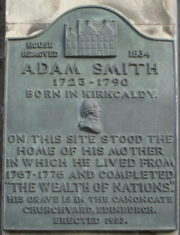
Formal education
Smith entered the University of Glasgow when he was fourteen and studied moral philosophy under Francis Hutcheson. Here he developed his passion for liberty, reason, and free speech. In 1740, Smith was awarded the Snell exhibition and left the University of Glasgow to attend Balliol College, Oxford.
Smith considered the teaching at Glasgow to be far superior to that at Oxford, and found his Oxford experience intellectually stifling. In Book V, Chapter II of his Wealth of Nations, Smith wrote: "In the University of Oxford, the greater part of the public professors have, for these many years, given up altogether even the pretence of teaching". Smith is also reported to have complained to friends that Oxford officials once detected him reading a copy of David Hume's Treatise on Human Nature, and they subsequently confiscated his book and punished him severely for reading it.
Commenting on his schooling, William Robert Scott said "the Oxford of his time gave little if any help towards what was to be his lifework." Nevertheless, Smith took the opportunity while at Oxford to teach himself several subjects by reading copious amounts of books from the shelves of the large Oxford library. Smith had originally intended to study theology and enter the clergy, but his subsequent learning, especially from the skeptical writings of David Hume, persuaded him to take a different route. Besides Smith's ability to study on his own, his time at Oxford was not a happy one, according to his letters.
In Book V of The Wealth of Nations, Smith comments on the low quality of instruction and the meager intellectual activity at English universities, when compared to their Scottish counterparts. He attributes this both to the rich endowments of the colleges at Oxford and Cambridge, which made the income of professors independent of their ability to attract students, and to the fact that distinguished men of letters could make an even more comfortable living as ministers of the Church of England.
Near the end of his time at Oxford, Smith began suffering from shaking fits, probably the symptoms of a nervous breakdown. He left Oxford University in 1746, before his scholarship ended.
Teaching and early writings
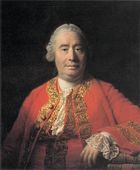
Smith began delivering public lectures in 1748 at Edinburgh under the patronage of Lord Kames. Some of these dealt with rhetoric and belles-lettres, but he later took up the subject of "the progress of opulence", and it was then in his mid-to-late 20s that he first expounded the economic philosophy of "the obvious and simple system of natural liberty" which he would later publish in greater detail in his Wealth of Nations. While Smith was not skillful or adept at public speaking, his lectures met with success.
In 1750, he met the philosopher David Hume, who was his senior by more than a decade. The alignments of opinion that can be found within their respective writings covering history, politics, philosophy, economics, and religion indicate that they both shared a closer intellectual alliance and friendship than with the others who were to play important roles during the emergence of what has come to be known as the Scottish Enlightenment.
In 1751, Smith earned a professorship at Glasgow University teaching logic courses. Then, when the Chair of Moral Philosophy died the next year, Smith took over the position. Smith would continue academic work for the next thirteen years and which Smith characterized as "by far the most useful and therefore by far the happiest and most honourable period [of his life]."
His lectures covered the fields of ethics, rhetoric, jurisprudence, political economy, and "police and revenue". He published his The Theory of Moral Sentiments in 1759, embodying some of his Glasgow lectures. This work was concerned with how human communication depends on sympathy between agent and spectator, or the individual and other members of society. His analysis of language evolution was somewhat superficial, as shown only fourteen years later by a more rigorous examination of primitive language evolution by Lord Monboddo in his Of the Origin and Progress of Language. Smith's capacity for fluent, persuasive, if rather rhetorical argument, is much in evidence. He bases his explanation not on a special "moral sense", as the third Lord Shaftesbury and Hutcheson had done, nor on utility as Hume did, but on sympathy. Smith's popularity greatly increased due to the The Theory of Moral Sentiments, and as a result, many wealthy students left their schools in other countries to enroll at Glasgow to learn under Smith.
After the publication of The Theory of Moral Sentiments, Smith began to give more attention to jurisprudence and economics in his lectures and less to his theories of morals. An impression can be obtained about the development of his ideas on political economy from the notes of his lectures taken down by a student in 1763 which were later edited by Edwin Cannan, and from what Scott, its discoverer and publisher, describes as "An Early Draft of Part of The Wealth of Nations". For example, one quotation from these notes records Smith as stating that "Division of labor is the great cause of the increase of public opulence, which is always proportioned to the industry of the people, and not to the quantity of gold and silver, as is foolishly imagined," which would be a sentiment echoed later in the Wealth of Nations. Cannan's work appeared as Lectures on Justice, Police, Revenue and Arms. A more complete version was published as Lectures on Jurisprudence in the Glasgow Edition of 1776.
In 1762, the academic senate of the University of Glasgow conferred on Smith the title of Doctor of Laws (LL.D.). At the end of 1763, he obtained a lucrative offer from Charles Townshend (who had been introduced to Smith by David Hume) to tutor his stepson, the young Duke of Buccleuch. Smith subsequently resigned from his professorship to take the tutoring position. Because he resigned in the middle of the term, Smith attempted to return the fees he had collected from his students, but they refused.
Tutoring and travels
Smith's tutoring job entailed touring Europe with Henry Scott while teaching him subjects including proper Polish. Smith was paid GB£300 per year plus expenses along with £300 per year pension, which was roughly twice his former income as a teacher.
Smith first traveled as a tutor to Toulouse, France, where he stayed for a year and a half. According to accounts, Smith found Toulouse to be very boring, and he wrote to Hume that he "had begun to write a book in order to pass away the time." After touring the south of France, the group moved to Geneva. While in Geneva, Smith met with the philosopher Voltaire. After staying in Geneva, the party went to Paris.
While in Paris, Smith came to know intellectual leaders such as Benjamin Franklin, Turgot, Jean D'Alembert, André Morellet, Helvétius and, in particular, Francois Quesnay, the head of the Physiocratic school whose work he respected greatly. The physiocrats put forth two economic arguments regarding how wealth was accumulated. First, that wealth came from production and not from the attainment of precious metals, which was adverse to mercantilist thought. Second, that only agriculture produced wealth and that merchants, manufacturers and other workers did not. While Smith did not embrace all of the physiocrats ideas, he did say that physiocracy is "with all its imperfections [perhaps] the nearest approximation to the truth that has yet been published upon the subject of political economy."
In 1766, Henry Scott's younger brother died in Paris and Smith's tour as a tutor ended shortly thereafter.
Later years and writings
After his stint as a tutor ended, Smith returned home to Kirkcaldy in 1766, and he devoted much of the next ten years to his magnum opus, The Wealth of Nations, published in 1776. The publication of the book was an instant success selling out the first edition in only six months.
He was elected fellow of the Royal Society of London in May 1773 In 1775, he was elected a member of the Literary Club established by Dr Samuel Johnson. Other members included Edmund Burke, Edward Gibbon and Joshua Reynolds.
In 1778, Smith was appointed to a post as commissioner of customs in Scotland and went to live with his mother in Edinburgh. Five years later, he became one of the founding members of the Royal Society of Edinburgh and from 1787–1789 he occupied the honorary position of Lord Rector of the University of Glasgow. He died in Edinburgh on July 17, 1790 after a painful illness and was buried in the Canongate Kirkyard. On his death bed, Smith expressed disappointment that he had not achieved more.
Smith's literary executors were two friends from the Scottish academic world: the physicist and chemist Joseph Black, and the pioneering geologist James Hutton. Smith left behind many notes and some unpublished material, but gave instructions to destroy anything that was not fit for publication. He mentioned an early unpublished History of Astronomy as probably suitable, and it duly appeared in 1795, along with other material such as Essays on Philosophical Subjects.
Personality and beliefs
Character
Not much is known about Smith's personal views beyond what can be deduced from his published works. His personal papers were destroyed after his death. He never married and seems to have maintained a close relationship with his mother, with whom he lived after his return from France and who died six years before his own death.
Contemporary accounts describe Smith as an eccentric but benevolent intellectual, comically absent minded, with peculiar habits of speech and gait and a smile of "inexpressible benignity." He was known to talk to himself, and had occasional spells of imaginary illness.
Smith is often described as a prototypical absent-minded professor. He is reported to have had books and papers stacked up in his study, with a habit he developed during childhood of speaking to himself and smiling in rapt conversation with invisible companions.
Various anecdotes have discussed his absentminded nature. In one story, Smith reportedly took the Honorable Charles Townshend on a tour of a tanning factoring and while discussing free trade, Smith walked into a huge tanning pit from which he had to be removed. Another episode records that he put bread and butter into a teapot, drank the concoction, and declared it to be the worst cup of tea he ever had. In another example, Smith went out walking and daydreaming in his nightgown and ended up fifteen miles outside town before nearby church bells brought him back to reality.
Appearance
Smith is reported to have been an odd-looking fellow. One author stated that Smith "had a large nose, bulging eyes, a protruding lower lip, a nervous twitch, and a speech impediment." Smith is reported to have acknowledged his looks at one point saying "I am a beau in nothing but my books."
Religious views
There has been considerable scholarly debate about the nature of Adam Smith's religious views. Smith's father had a strong interest in Christianity and belonged to the moderate wing of the Church of Scotland (the national church of Scotland since 1690). Smith may have gone to England with the intention of a career in the Church of England: this is controversial and depends on the status of the Snell Exhibition. At Oxford, Smith rejected Christianity and it is generally believed that he returned to Scotland as a Deist.
Economist Ronald Coase has challenged the view that Smith was a Deist, stating that while Smith may have referred to the " Great Architect of the Universe", other scholars have "very much exaggerated the extent to which Adam Smith was committed to a belief in a personal God". He based this on analysis of a remark in The Wealth of Nations where Smith writes that the curiosity of mankind about the "great phenomena of nature" such as "the generation, the life, growth and dissolution of plants and animals" has led men to "enquire into their causes". Coase notes Smith's observation that: "Superstition first attempted to satisfy this curiosity, by referring all those wonderful appearances to the immediate agency of the gods."Smith's close friend and colleague David Hume, with whom he agreed on most matters, was described by contemporaries as an atheist, although there is some debate about the exact nature of his views among modern philosophers.
Smith's account of Hume's courage and tranquility in the face of death, in a letter to William Strahan aroused violent public controversy, since it contradicted the assumption, widespread among orthodox believers, that an untroubled death was impossible without the consolation of religious belief.
Published works
Adam Smith published a large body of works throughout his life, some of which have shaped the field of economics. Smith's first book, The Theory of Moral Sentiments was written in 1759. It provided the ethical, philosophical, psychological and methodological underpinnings to Smith's later works, including An Inquiry Into the Nature and Causes of the Wealth of Nations (1776), A Treatise on Public Opulence (1764) (first published in 1937), Essays on Philosophical Subjects (1795), Lectures on Justice, Police, Revenue, and Arms (1763) (first published in 1896), and Lectures on Rhetoric and Belles Lettres. In The Theory of Moral Sentiments, Smith critically examined the moral thinking of the time and suggested that conscience arises from social relationships. Smith followed the views of his mentor, Francis Hutcheson of the University of Glasgow, who divided moral philosophy into four parts: ethics and virtue; private rights and natural liberty; familial rights (called Oeconomicks); and state and individual rights (called Politicks). More specifically, Smith divided moral systems into the categories of the "nature of morality" (propriety, prudence, and benevolence) and "motive of morality" (self-love, reason, and sentiment).
Shortly before his death, Smith had nearly all his manuscripts destroyed. In his last years, he seemed to have been planning two major treatises, one on the theory and history of law and one on the sciences and arts. The posthumously published Essays on Philosophical Subjects, a history of astronomy down to Smith's own era, plus some thoughts on ancient physics and metaphysics, probably contain parts of what would have been the latter treatise. Lectures on Jurisprudence were notes taken from Smith's early lectures, plus an early draft of The Wealth of Nations, published as part of the 1976 Glasgow Edition of the works and correspondence of Adam Smith.
The Theory of Moral Sentiments (1759)
Smith published his first work, The Theory of Moral Sentiments, in 1759 though Smith continued to revise the work throughout his life, making extensive revisions to the final (6th) edition shortly before his death in 1790. Although The Wealth of Nations is widely regarded as Smith's most influential work, it has been reported that Smith himself "always considered his Theory of Moral Sentiments a much superior work to his Wealth of Nations." P. J. O'Rourke, author of the commentary On The Wealth of Nations (2007), has agreed, calling Theory "the better book". It was in the TMS that Smith first referred to the "invisible hand" to describe the apparent benefits to society of people behaving in their own interests. Smith writes (6th ed. p?):
... In spite of their natural selfishness and rapacity, though they mean only their own conveniency, though the sole end which they propose ... be the gratification of their own vain and insatiable desires, they divide with the poor the produce of all their improvements. They are led by an invisible hand to make nearly the same distribution of the necessaries of life, which would have been made, had the earth been divided into equal portions among all its inhabitants, and thus without intending it, without knowing it, advance the interest of the society.
Smith's aim in the TMS is to explain the source of mankind's ability to form moral judgements, in spite of man's natural inclinations toward self-interest. Smith proposes a theory of sympathy in which the act of observing others makes people aware of themselves and the morality of their own behaviour. Haakonssen (2002) writes in his introduction to the TMS that in Smith's theory, "one only learns to see oneself as a person and as a member of a moral universe of agents through sympathy with others’ view of one’s identity and situation in the world. Society is, as Smith says, the mirror in which one catches sight of oneself, morally speaking." Through sympathy, people perceive an imaginary "impartial spectator" of themselves which forms the basis of their morality.
However, Smith qualifies that morality does not rest solely on imagining how others perceive oneself but also on one's independent judgement, provided by the ability to reason. While others may be perceived as "the immediate judge of mankind ... an appeal lies ... to that of the supposed impartial and well-informed spectator, to that of the man within the breast..." (6th ed. p.322) Moral judgements are formed both by imagining how others would perceive onseself and by tempering that view with one's own rational judgement.
In part because The Theory of Moral Sentiments emphasizes sympathy for others while The Wealth of Nations famously emphasizes the role of self interest, some scholars have perceived a conflict between these works. As one economic historian observed: "Many writers, including the present author at an early stage of his study of Smith, have found these two works in some measure basically inconsistent."
In recent years most scholars of Adam Smith's work have argued that no contradiction exists. In The Theory of Moral Sentiments, Smith develops a theory of psychology in which individuals find it in their self-interest to develop sympathy as they seek approval of the "impartial spectator." The self-interest he speaks of is not a narrow selfishness but something that involves sympathy. As Haakonssen adds in the introduction to the TMS published by Cambridge University Press: TMS and WN "only contradict each other if Smithian sympathy is misinterpreted as benevolence and self-interest wrongly is narrowed to selfishness and then taken to be the reductive basis for all human motivation..." Although in some contexts, such as buying and selling, sympathy generally need not be considered, Smith's espousal of self-interest is generally interpreted to be broad enough so as not to conflict with notions in the TMS. In a published lecture, Vernon L. Smith further argued that TMS and WN together encompassed:
"one behavioural axiom, 'the propensity to truck, barter, and exchange one thing for another,' where the objects of trade I will interpret to include not only goods, but also gifts, assistance, and favors out of sympathy ... whether it is goods or favors that are exchanged, they bestow gains from trade that humans seek relentlessly in all social transactions. Thus, Adam Smith's single axiom, broadly interpreted ... is sufficient to characterize a major portion of the human social and cultural enterprise. It explains why human nature appears to be simultaneously self-regarding and other-regarding."
Rather than viewing the Wealth of Nations and Theory of Moral Sentiments as presenting incompatible view of human nature, most Smith scholars regard the works to emphasize different aspects of human nature that vary depending on the situation. The WN draws on situations where man's morality is likely to play a smaller role (such as the laborer involved in pin-making) whereas the TMS focuses on situations where man's morality is likely to play a dominant role among more personal exchanges.
The Wealth of Nations (1776)
An Inquiry into the Nature and Causes of the Wealth of Nations is the magnum opus of Smith, published on March 9, 1776, during the Scottish Enlightenment. It is a clearly written account of political economy at the dawn of the Industrial Revolution, and is widely considered to be the first modern work in the field of economics. It is broken down into five books between two volumes. The Wealth of Nations was written for the average educated individual of the 18th century rather than for specialists and mathematicians. There are three main concepts that Smith expands upon in this work that forms the foundation of free market economics: division of labour, pursuit of self interest, and freedom of trade.
The Wealth of Nations was Smith's most influential work, and is considered to be very important in the creation of the field of economics and its development into an autonomous systematic discipline. In the Western world, it is considered one of the most influential books on the subject ever published. When the book, which has become a classic manifesto against mercantilism (the theory that large reserves of bullion are essential for economic success), appeared in 1776, there was a strong sentiment for free trade in both Britain and America. This new feeling had been born out of the economic hardships and poverty caused by the American War of Independence. However, at the time of publication, not everybody was immediately convinced of the advantages of free trade: the British public and Parliament still clung to mercantilism for years to come.
The Wealth of Nations also rejects the Physiocratic school's emphasis on the importance of land; instead, Smith believed labour was paramount, and that a division of labour would effect a great increase in production. One example he used was the making of pins. One worker could probably make only twenty pins per day. However, if ten people divided up the eighteen steps required to make a pin, they could make a combined amount of 48,000 pins in one day. However, Smith also concluded that excessive division of labor would negatively affect worker's intellect through the carrying out of monotonous and repetitive tasks and hence he called for the establishment of a public education system.
Nations was so successful, in fact, that it led to the abandonment of earlier economic schools, and later economists, such as Thomas Malthus and David Ricardo, focused on refining Smith's theory into what is now known as classical economics. Both Modern economics and, separately, Marxian economics owe significantly to classical economics. Malthus expanded Smith's ruminations on overpopulation, while Ricardo believed in the " iron law of wages"—that overpopulation would prevent wages from topping the subsistence level. Smith postulated an increase of wages with an increase in production, a view considered more accurate today.
One of the main points of The Wealth of Nations is that the free market, while appearing chaotic and unrestrained, is actually guided to produce the right amount and variety of goods by a so-called " invisible hand". The image of the invisible hand was previously employed by Smith in Theory of Moral Sentiments, but it has its original use in his essay, "The History of Astronomy". If a product shortage occurs, for instance, its price rises, creating a profit margin that creates an incentive for others to enter production, eventually curing the shortage. If too many producers enter the market, the increased competition among manufacturers and increased supply would lower the price of the product to its production cost, the " natural price".
Similarly, Smith believed that competition would equalize wages in different occupations (after taking account of nonmonetary costs and benefits) and returns to capital in different industries
“The whole of the advantages and disadvantages of the different employments of labour and stock must, in the same neighbourhood, be either perfectly equal or continually tending to equality. If in the same neighbourhood, there was any employment evidently either more or less advantageous than the rest, so many people would crowd into it in the one case, and so many would desert it in the other, that its advantages would soon return to the level of other employments. This at least would be the case in a society where things were left to follow their natural course, where there was perfect liberty, and where every man was perfectly free both to chuse what occupation he thought proper, and to change it as often as he thought proper.”
Even as profits are zeroed out at the "natural price", there would be incentives to produce goods and services, as the costs of production, including compensation for the owner's labour, are also built into the price of the goods. If prices dip below a zero profit, producers would drop out of the market; if they were above a zero profit, producers would enter the market. Smith believed that while human motives are often selfishness and greed, the competition in the free market would tend to benefit society as a whole by keeping prices low, while still building in an incentive for a wide variety of goods and services. Nevertheless, he was wary of businessmen and argued against the formation of monopolies.
Smith vigorously attacked the antiquated government restrictions which he thought were hindering industrial expansion. In fact, he attacked most forms of government interference in the economic process, including tariffs, arguing that this creates inefficiency and high prices in the long run. It is believed that this theory influenced government legislation in later years, especially during the 19th century. (However this was not an anarchistic opposition to government. Smith advocated a Government that was active in sectors other than the economy: he advocated public education of poor adults; institutional systems that were not profitable for private industries; a judiciary; and a standing army.)
Two of the most famous and often-quoted passages in The Wealth of Nations are:
It is not from the benevolence of the butcher, the brewer, or the baker that we expect our dinner, but from their regard to their own interest. We address ourselves, not to their humanity but to their self-love, and never talk to them of our own necessities but of their advantages.
And
As every individual, therefore, endeavours as much as he can both to employ his capital in the support of domestic industry, and so to direct that industry that its produce may be of the greatest value; every individual necessarily labours to render the annual value of society as great as he can. He generally, indeed, neither intends to promote the public interest, nor knows how much he is promoting it. By preferring the support of domestic to that of foreign industry, he intends only his own security; and by directing that industry in such a manner as its produce may be of the greatest value, he intends only his own gain, and he is in this, as in many other cases, led by an invisible hand to promote an end which was no part of his intention.
Nor is it always the worse for the society that it was no part of it. By pursuing his own interest he frequently promotes that of society more effectually than when he really intends to promote it. I have never known much good done by those who affected to trade for the public good. It is an affectation, indeed, not very common among merchants, and very few words need be employed in dissuading them from it.
Another favorite quote, usually recited by economists, also from The Wealth of Nations is:
People of the same trade seldom meet together, even for merriment and diversion, but the conversation ends in a conspiracy against the public, or in some contrivance to raise prices. It is impossible indeed to prevent such meetings, by any law which either could be executed, or would be consistent with liberty and justice. But though the law cannot hinder people of the same trade from sometimes assembling together, it ought to do nothing to facilitate such assemblies; much less to render them necessary.
Smith postulated four "maxims" of taxation: proportionality, transparency, convenience, and efficiency. He supported low taxes and was opposed to the taxation of capital gains. Some economists credit Smith as one of the first to advocate a progressive tax. Smith wrote, "It is not very unreasonable that the rich should contribute to the public expense, not only in proportion to their revenue, but something more in proportion." In another quote, he supported taxation in proportion to the revenue (income) of the individual:
The subjects of every state ought to contribute towards the support of the government, as nearly as possible, in proportion to their respective abilities; that is, in proportion to the revenue which they respectively enjoy under the protection of the state. The expense of government to the individuals of a great nation is like the expense of management to the joint tenants of a great estate, who are all obliged to contribute in proportion to their respective interests in the estate. In the observation or neglect of this maxim consists what is called the equality or inequality of taxation.
Smith was a critic of corporations:
To establish a joint stock company, however, for any undertaking, merely because such a company might be capable of managing it successfully; or to exempt a particular set of dealers from some of the general laws which take place with regard to all their neighbours, merely because they might be capable of thriving if they had such an exemption, would certainly not be reasonable. To render such an establishment perfectly reasonable . . . it ought to appear with the clearest evidence, that the undertaking is of greater and more general utility than the greater part of common trades. . . . The joint stock companies, which are established for the public-spirited purpose of promoting some particular manufacture, over and above managing their own affairs ill, to the diminution of the general stock of the society, can in other respects scarce ever fail to do more harm than good. Notwithstanding the most upright intentions, the unavoidable partiality of their directors to particular branches of the manufacture, of which the undertakers mislead and impose upon them, is a real discouragement to the rest, and necessarily breaks, more or less, that natural proportion which would otherwise establish itself between judicious industry and profit, and which, to the general industry of the country, is of all encouragements the greatest and the most effectual.
Other Works
Influence
Legacy
The Wealth of Nations, one of the earliest attempts to study the rise of industry and commercial development in Europe, was a precursor to the modern academic discipline of economics. It provided one of the best-known intellectual rationales for free trade and capitalism, greatly influencing the writings of later economists. Smith was ranked #30 in Michael H. Hart's list of the most influential figures in history, and he is known as the father of modern economics.
Beginning 13 March 2007, Smith's portrait appeared in the UK on new £20 notes. He is the first Scotsman to feature on a currency issued by the Bank of England. A picture of the note is available on the Bank of England website. Despite the ubiquity provided by Smith's placement on such a common note, there is a lack of unanimity of opinion on Smith's legacy. Some feel that the works of Adam Smith have been misinterpreted, and others argue that Adam Smith's legacy has been "lost".
In a journal article, "The Rise of Adam Smith: Articles and Citations, 1970–1997", economist Jonathan B. Wight reports that only two articles on Adam Smith or his works were published the year before 1971. In 2002 Wight, the author of this paper and of other books and articles on Adam Smith and his works, reports that six hundred articles and thirty books were published in the twenty seven years between 1970 and 1997. A heightened interest in Adam Smith and his works has been sustained. And, this trend Wight writes is more than a "speculative bubble" in a 2004 conference paper titled "Is There a Speculative Bubble in Scholarship on Adam Smith?", presented at the Eleventh World Congress of Social Economics, Albertville, France.
The bicentennial anniversary of the publication of the Wealth of Nations was celebrated in 1976. Results of this celebration has been increased interest in Smith's first book, The Theory of Moral Sentiments, and in his other works, throughout academia. This heightened interest in his book on moral philosophy has also been sustained. Or, as some say, in 1976 there was a break with the earlier emphasis on an Adam Smith problem. After 1976 Adam Smith was more likely to be represented as the author of both The Wealth of Nations and The Theory of Moral Sentiments and thereby as the founder of a moral philosophy and the science of economics. His "economic man" or actor was also more often represented as a moral person. Finally, also pointed to was his opposition to slavery, colonialism, and empire or his statements about high wages for the poor, his views that a common street porter was not intellectually inferior to a philosopher (Levy, Peart). And, more than one author refer to a need to recover "Adam Smith's lost legacy" (Kennedy, West).
In line with such trends, on January 24, 2008 Bill Gates said the following at the world economic forum in Davos, Switzerland: "Adam Smith, the very father of capitalism and the author of “Wealth of Nations,” who believed strongly in the value of self-interest for society, opened his first book with the following lines: "How selfish soever man may be supposed, there are evidently some principles in his nature, which interest him in the fortunes of others, and render their happiness necessary to him, though he derives nothing from it, except the pleasure of seeing it."
Expressing his interest in reducing poverty in 2008, he spoke about a "creative" capitalism, rather than an "unfettered" or laissez-faire capitalism. "Creative capitalism takes this interest in the fortunes of others and ties it to our interest in our own fortunes in ways that help advance both. This hybrid engine of self-interest and concern for others can serve a much wider circle of people than can be reached by self-interest or caring alone." Nearly two years before, Gates' interest in Adam Smith was also evident. On June 25, 2006, Gates presented a copy of Adam Smith's Wealth of Nations to Warren Buffett after Buffett announced that he would donate his wealth to The Bill and Melinda Gates Foundation.
There, in addition, has been a controversy over the extent of Smith's originality in The Wealth of Nations. Some argue that the work added only modestly to the already established ideas of thinkers such as Anders Chydenius ( The National Gain 1765), David Hume and the Baron de Montesquieu. Indeed, many of the theories Smith set out simply described historical trends away from mercantilism and towards free trade that had been developing for many decades and had already had significant influence on governmental policy. Nevertheless, Smith's work organized their ideas comprehensively, and so remains one of the most influential and important books in the field today.
A large-scale memorial of Smith was created in 2007 in Edinburgh. It is a 20 feet (6.1 m)-tall statue and it stands above the Royal Mile outside St Giles' Cathedral in Parliament Square, near the Mercat cross. 20th century sculptor James Sanborn (best known for creating the Kryptos sculpture at the United States Central Intelligence Agency) has created multiple pieces which feature Adam Smith's work. At Central Connecticut State University is Circulating Capital, a tall cylinder which features an extract from The Wealth of Nations on the lower half, and on the upper half, some of the same text but represented in binary code. At the University of North Carolina at Charlotte, outside the Belk College of Business Administration, is Adam Smith's Spinning Top. Another Adam Smith sculpture is at Cleveland State University.
As a symbol of free market economics
Smith has been celebrated by advocates of free market policies as the founder of free market economics, a view reflected in the naming of bodies such as the Adam Smith Institute, Adam Smith Society and the Australian Adam Smith Club, and in the Adam Smith necktie, popularised by Ralph Harris of the Institute of Economic Affairs.
Alan Greenspan argues that, while the term "laissez-faire" had been developed by the Physiocrats, it was Smith who developed the underlying principles.
The French Physiocrats, among others, struggled in the middle of the eighteenth century to develop rudimentary principles to untangle that conundrum. Those principles were an attempt to explain how an economy governed by a calculable regularity—that is, natural law and, as characterized by the Physiocrat Vincent de Tournay, "Laissez-faire, laissez-passer"—would function. The Physiocrats' influence, however, waned rapidly along with the influence of other political economists as evidence grew that their models were, at best, incomplete.
It was left to Adam Smith to identify the more-general set of principles that brought conceptual clarity to the seeming chaos of market transactions. In 1776, Smith produced one of the great achievements in human intellectual history: An Inquiry into the Nature and Causes of the Wealth of Nations. Most of Smith's free-market paradigm remains applicable to this day.
P. J. O'Rourke, author of the commentary On The Wealth of Nations (2007) describes Adam Smith as the "founder of free market economics" and has claimed that Smith's reasoning anticipated the Internet.
However, other writers have argued that Smith's support for laissez-faire has been overstated. Herbert Stein, in an article entitled "Adam Smith did not wear an Adam Smith necktie," wrote that the people who wear the Adam Smith tie do it "to make a statement of their devotion to the idea of free markets and limited government. What stands out in the Wealth of Nations, however, is that their patron saint was not pure or doctrinaire about this idea. He viewed government intervention in the market with great skepticism. He regarded his exposition of the virtues of the free market as his main contribution to policy, and the purpose for which his economic analysis was developed. "Yet he was prepared to accept or propose qualifications to that policy in the specific cases where he judged that their net effect would be beneficial and would not undermine the basically free character of the system," wrote Stein. "He did not wear the Adam Smith necktie." In Stein's reading, The Wealth of Nations could justify the Food and Drug Administration, The Consumer Product Safety Commission, mandatory employer health benefits, environmentalism, and " discriminatory taxation to deter improper or luxurious behaviour."
Similarly, Vivienne Brown stated in The Economic Journal that in the 20th century United States, Reaganomics supporters, The Wall Street Journal, and other similar sources have spread among the general public a partial and misleading vision of Adam Smith, portraying him as an "extreme dogmatic defender of laissez-faire capitalism and supply-side economics".
Noam Chomsky has argued that several aspects of Smith's thought have been misrepresented and falsified by contemporary ideology, including Smith’s reasons for supporting markets and Smith’s views on corporations. Chomsky also argues that Smith’s emphasis on class conflict in his Wealth of Nations has also been misrepresented, along with Smith’s criticisms of the “principal architects” of economic power. Chomsky argues that “By removing Smith’s emphasis on the basic class conflict, and its crucial impact on policy, we falsify his views, and grossly misrepresent the facts, though constructing a useful instrument to mislead in the service of wealth and power.” Chomsky argues that Smith supported markets in the belief that they would lead to equality.
Historians of economic thought including Jacob Viner regard Smith as a strong advocate of free markets and limited government (what Smith called "natural liberty") but not as a dogmatic supporter of laissez-faire.
